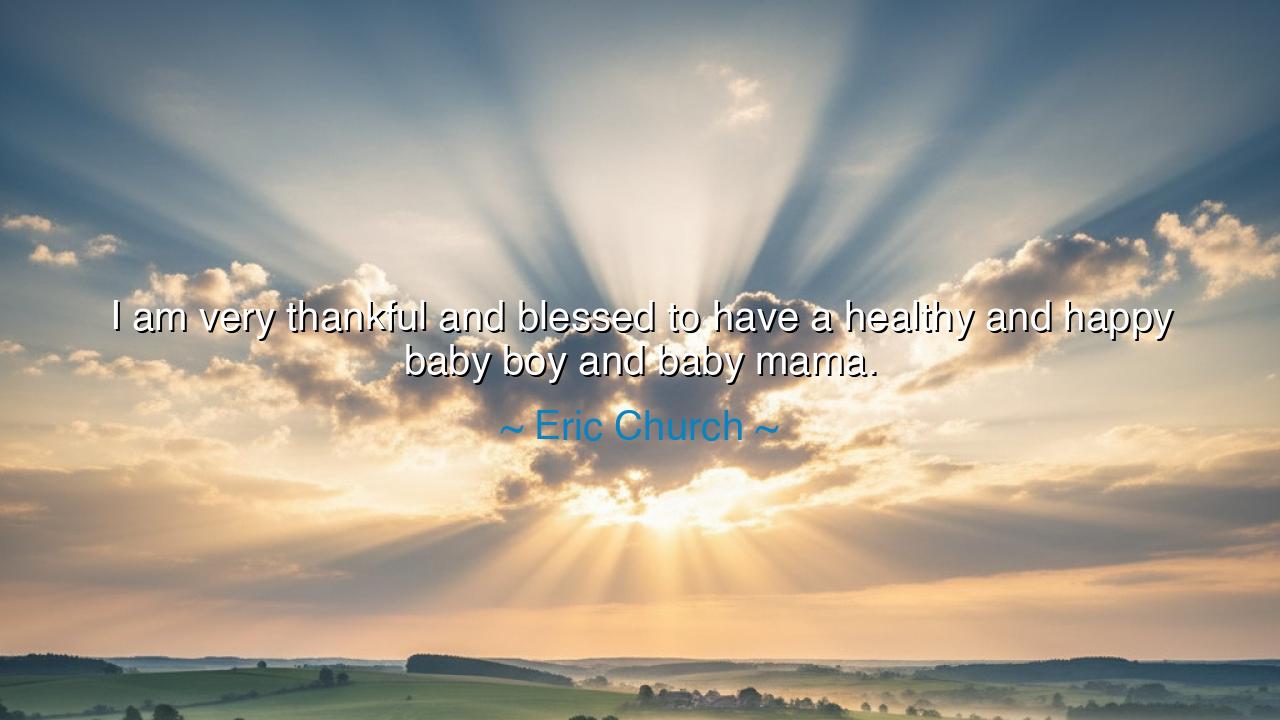
I am very thankful and blessed to have a healthy and happy baby






Hear the words of Eric Church, sung not upon the stage but from the depths of a father’s heart: “I am very thankful and blessed to have a healthy and happy baby boy and baby mama.” This utterance, though simple, carries within it the weight of life’s greatest treasures—love, health, family, and the sacred duty of care. For here the singer is not praising wealth, nor glory, nor fame, but the eternal gifts that no crown can buy and no gold can equal.
The ancients knew this truth well. Kings would conquer empires, yet in the quiet of their chambers they longed most for the laughter of children and the embrace of those they loved. What is a baby boy but the promise of tomorrow, living proof that life continues? What is a beloved partner—the baby mama, as he says—but the guardian of that promise, the one who carries and nurtures life itself? To be thankful for such blessings is to recognize that the true wealth of a man lies not in his possessions, but in the people entrusted to his care.
Consider the story of Marcus Aurelius, the philosopher-king of Rome. In his Meditations, written amidst the burdens of ruling an empire, he often returned to thoughts of family, of the fleeting joys of his children. Though he was emperor, he was humbled by the same truth Eric Church proclaims: that the gift of a healthy child and a beloved companion is greater than all the victories of the battlefield. For emperors pass away, monuments crumble, but the love between parent, child, and partner endures in memory and legacy.
Church speaks also of being blessed, acknowledging forces beyond his own strength. For man may labor, but the health of a child, the happiness of a family—these cannot be guaranteed by effort alone. They are gifts, mysterious and divine. To call oneself blessed is to bow in humility before the mystery of life, to admit that joy is not only earned but given. This is the wisdom of the grateful, who know that not all are granted such treasures, and who therefore cherish them with reverence.
There is heroism in his gratitude. Many who taste success forget to honor the simple foundations of their joy, chasing after further fame while neglecting family. But Eric Church proclaims openly that his greatest triumph is not his music, but his role as father and partner. In this humility he mirrors the ancients, who taught that the noblest duty of man is not conquest, but the protection and nurturing of his household. To be thankful for family is to stand in alignment with the deepest calling of humanity.
The lesson, then, is plain: do not overlook the quiet blessings of your life. Health, happiness, the laughter of children, the love of a partner—these are the true crowns of existence. Wealth fades, applause quiets, but these treasures endure in the heart forever. Be thankful, as Eric Church is, for every day that your loved ones are well, for every smile that lights your home, for every shared moment that becomes a memory.
Practical wisdom calls you to action: tell your loved ones often that you are grateful for them. Do not wait for hardship to remind you of their worth. Protect their health, nurture their joy, and count them as your greatest riches. In your prayers, meditations, or reflections, give thanks daily for their presence. For in doing so, you will cultivate the spirit of gratitude that transforms ordinary days into sacred gifts.
Thus, let the teaching of Eric Church endure: that the true measure of a man’s blessings lies not in his stage, his wealth, or his fame, but in the simple and eternal gifts of a baby boy, a beloved baby mama, and the joy of being thankful. For in the end, the heart that cherishes these blessings will never be poor, and the soul that guards them will live in eternal abundance.






AAdministratorAdministrator
Welcome, honored guests. Please leave a comment, we will respond soon